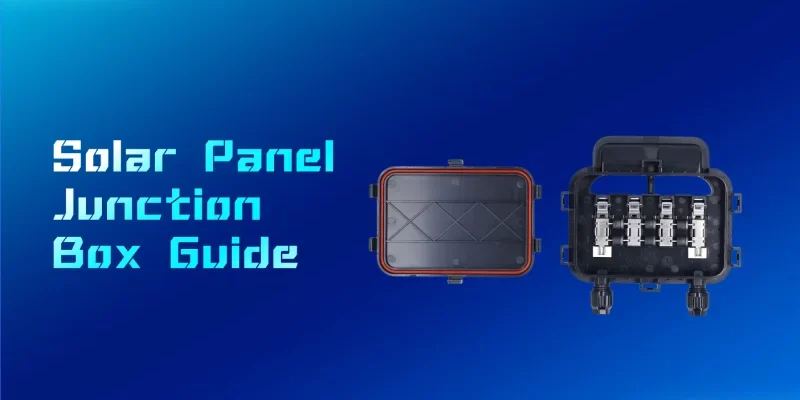A solar panel junction box is a crucial component in solar energy systems, serving as the interface between solar panels and the electrical system while providing protection and efficient energy transfer. This comprehensive guide explores the role, types, selection criteria, assembly, and installation of junction boxes in solar panel systems, offering valuable insights for both novice and experienced solar enthusiasts.

Understanding Solar Junction Boxes
Junction boxes in solar panel systems serve as critical connection points, housing essential components like diodes, terminals, and connectors. These enclosures protect internal electrical connections from environmental factors such as moisture, dust, and physical damage. The diodes within the box play a crucial role in preventing backflow of current and protecting against the “hotspot effect” that can occur when some panels are shaded. By facilitating secure connections between solar panels and the rest of the system, junction boxes enable safe and efficient energy transfer, making them indispensable for the overall functionality and longevity of solar installations.
Types of Solar Junction Boxes
Various types of junction boxes are available for solar panel systems, each designed to meet specific needs and environmental conditions:
- Plastic Junction Boxes: Lightweight and corrosion-resistant, these are ideal for most residential applications.
- Metal Junction Boxes: Offer superior durability and protection, but may require additional insulation.
- IP-rated Junction Boxes: Designed with IP65 or IP67 ratings, these boxes provide excellent protection against dust and water, making them suitable for outdoor installations.
The choice of junction box depends on factors such as the installation environment, system requirements, and local regulations. For outdoor use, it’s crucial to select boxes specifically designed for photovoltaic (PV) applications with appropriate weather resistance ratings.
Choosing and Assembling Junction Boxes
When selecting a junction box for your solar panel system, consider compatibility with your specific panel type and other system components like inverters and charge controllers. Look for high IP ratings, such as IP65 or IP67, to ensure adequate protection against dust and moisture. The number of inputs should match your solar panel string configuration, and opting for reputable brands known for durability and safety is crucial.
Assembly requires careful attention to detail. Gather necessary tools like screwdrivers and wire strippers, then prepare wires by stripping ends cleanly. Connect wires to terminals following the system-specific wiring diagram, ensuring all connections are secure. After closing the junction box, apply silicone or a similar sealant around the edges to prevent water ingress. This meticulous process ensures optimal performance and longevity of your solar panel system.
Installation Tips and Mistakes
Proper installation of junction boxes is crucial for system safety and efficiency. Mount the box securely on a stable surface and carefully route wires from solar panels to prevent damage. Use heat shrink tubing or electrical tape to seal connections and protect against moisture ingress. Common mistakes to avoid include failing to secure all connections properly, which can lead to electrical failures, and overlooking environmental conditions that may cause premature box failure. Additionally, ensure compatibility with existing system components to prevent inefficiencies or potential hazards. Always consult manufacturer specifications and adhere to local codes when installing junction boxes to maximize the longevity and performance of your solar energy system.
Solar Panel Junction Box Guide VS Standard Junction Box
Solar panel junction boxes differ significantly from standard electrical junction boxes in several key aspects:
- Specialized Components: Solar junction boxes contain bypass diodes to prevent reverse current and mitigate the effects of shading, which are not found in typical electrical boxes.
- Environmental Protection: Designed for outdoor use, solar junction boxes have higher IP ratings (often IP65 or IP67) to withstand harsh weather conditions, UV radiation, and temperature fluctuations.
- Specific Connectors: They feature specialized connectors like MC4 or MC5 for easy and secure connection to solar panel systems, unlike standard electrical boxes.
- Heat Management: Solar junction boxes are engineered to regulate heat more effectively, crucial for maintaining the efficiency and longevity of solar panels.
These distinctions make solar panel junction boxes uniquely suited for photovoltaic applications, ensuring optimal performance and safety in solar energy systems.


